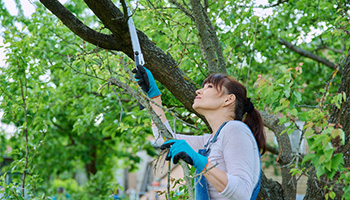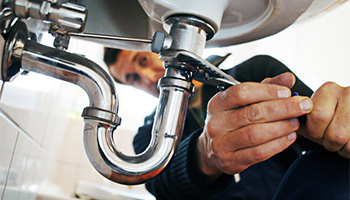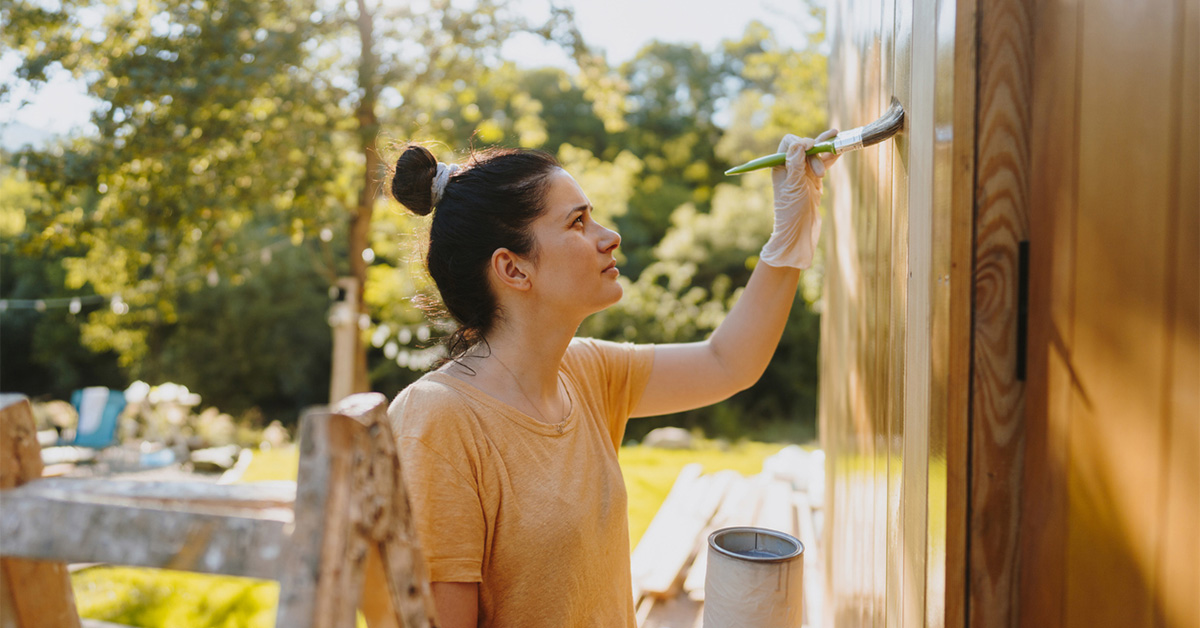Your home is one of life’s most significant investments, so following proper maintenance schedules is essential to avoid nightmare repairs. Although there are better ways to spend a weekend than doing chores, future you (and your wallet) will thank you for your time. According to a survey by Hippo, a home insurance provider, 65% of homeowners who experience repair issues admit that their problems could’ve been prevented with proactive maintenance. If you’d like to get ahead of your home maintenance projects but aren’t sure where to start, we put together this list of seven jobs you can start doing this weekend.
Home Maintenance Projects to Start This Weekend
- Inspect Your Roof
- Trim the Trees
- Service HVAC System
- Test Safety Devices
- Update Home Inventory
- Clean Dryer Vents
- Address Plumbing Issues
1. Inspecting Your Roof
Your home’s roof is its first line of defense from the elements and falling debris. When you allow your roof to deteriorate, you open the door to issues such as water damage, mold, poor insulation, and risk damaging your home’s overall structure. Like your home’s many systems, your roof requires proper inspections and maintenance to keep it in its best condition. Plus, staying ahead of any issues will help you avoid thousands of dollars in repairs.
What to do: The easiest way to stay on top of your roof’s health is to inspect it frequently, specifically after a harsh weather storm. You can visually examine your roof for loose or damaged shingles occasionally, but consider having it professionally inspected at least once every two years or sooner if you live in an area prone to extreme weather. Spring and summer months are typically the best time to get your roof inspected or repaired to avoid higher rates during the rain or snow season.
2. Don’t Forget to Trim the Trees

Old tree branches can greatly damage a home, especially during rough storms. On windy days, for example, tree branches can break off and fall onto your home’s structure or cause damage to its exterior due to constant friction. In drier climates, homeowners face an additional fire risk by having dry brush close to their property.
What to do: Before the start of storm season, give your home a walkaround to look for any tree branches that are making contact or hanging above your roof. Depending on the size and scope of the overhanging branches, hiring a professional may be safer than attempting a removal yourself. However, on the ground level, you don’t need a professional to remove any dry or dying vegetation near the side of your home that poses a fire risk. If you live in a dry climate, this is one of the home maintenance projects you don’t want to forget about.
3. Service Your Home’s HVAC Systems
Nothing is worse than trying to turn on your home’s AC during the heat of summer only to find out that it requires service. Furthermore, neglecting to perform simple maintenance projects, such as replacing your air filters, can affect the air quality in your home. This may seem simple, but ensuring your system runs smoothly without any clogs or hiccups is essential.
What to do: Clean or replace your home’s HVAC filters regularly. Most manufacturers recommend changing filters every three months, but that can vary depending on your location and whether you have pets. Besides changing your air filters, consider having your system professionally inspected or cleaned every year or two before peak seasons such as summer or winter. Clear any leaves or debris around your unit between inspections to prevent issues.
4. Test Smoke Alarms and Carbon Monoxide Detectors
Come winter, you’ll likely be using your home’s furnace or other heating elements to keep warm. If heating devices go bad, they can release toxic fumes like carbon monoxide or cause fires. You may also be like many others and have yet to change the batteries on your beeping fire alarm. Either way, keeping you and your family safe begins by ensuring your home’s safety devices function properly.
What to do: To keep smoke and carbon monoxide detectors working, test and replace their batteries regularly. If you have a fire extinguisher in your home, check its expiration date to confirm it is ready for use in an emergency. As an easy reminder, consider replacing batteries each time you reset your clocks for daylight savings.
5. Keep Your Home Inventory Updated

Disasters can strike at any time, so keeping your home inventory updated is important. If you don’t already have one, a home inventory is a way to record all your belongings inside your home. Having a home inventory list will prove extremely valuable during the claims process after a sudden disaster. Plus, having an updated home inventory will confirm you have the right amount of coverage for your personal belongings through your residential insurance.
What to do: If you have an ongoing home inventory list, consider making updates at least twice a year. That way, you will only spend a little bit of too much time adding new purchases in bulk. However, if you don’t have an inventory list, start today by doing one room at a time. Listing your possessions may seem daunting, but taking it slow can spread the project out over time. You can also utilize recording devices to help make the job easier.
6. Clean Out Dryer Vents
According to the National Fire Protection Association (NFPA), washing and drying machines cause an average of 15,970 fires annually, with 26% directly caused by dust, fiber, or lint. One of the easiest home maintenance projects is to clean dryer vents yearly to protect your home from a fire. Although many homeowners remember to clean out their lint filter between laundry loads, many more wait far longer to clean their exhaust vents, if at all.
What to do: To limit your fire risk, consider cleaning out your dryer vents 1-2 times a year. If your vent travels a short length or is on the ground level, you can do this job yourself. However, hiring a professional may be the easier option if your vents travel a great distance across various floors. Regardless of which option you choose, clean your vents regularly and be sure to touch every nook and cranny for the best results.
7. Don’t Forget About Your Plumbing

Checking for signs of water damage or leaks throughout your home is important, no matter the time of year. Simple leaks can become costly problems if left alone for extended periods. As water damage spreads, it can also lead to mold and structural damage concerns. Do your toilets run constantly? Do some of your sinks run or drain slowly? Are there any visible signs of damage on any exposed pipes or supply hoses? These are the questions you should ask yourself when searching for water-related issues.
Aside from your plumbing, remember to service your water heater as recommended by its manufacturer. Depending on your heater, you may need to adjust the pressure valve or flush it to keep it running efficiently. Always refer to your owner’s manual for a detailed understanding of how often you should service your water heater.
What to do: Visually inspect for signs in your bathroom, sink areas, showers, and washing room for water damage or leaks. If you notice anything concerning, quickly rectify the issue or contact a professional. If you have a traditional water heater, follow manual instructions to flush it out to remove sediment buildup.
Keep Your Home Prepared for the Unexpected
Having the proper home insurance is crucial whether you recently moved in or not. A homeowners insurance policy doesn’t just cover your home’s physical structure, it also covers your belongings and provides liability protection in the case of an accident. However, just like with any other insurance type, reviewing coverage regularly is important to ensure you are properly covered.
At AIS, we have over 55 years of experience helping our customers navigate the insurance marketplace. Our specialists can help you find and purchase reliable homeowners insurance wherever you live. To learn more about the coverage available, contact us at (888) 772-4247 or start a quote online.
The information in this article is obtained from various sources and is offered for educational purposes. Furthermore, it should not replace manuals or instructions provided by the manufacturer or the advice of a qualified professional. No warranty or appropriateness for a specific purpose is expressed or implied.


